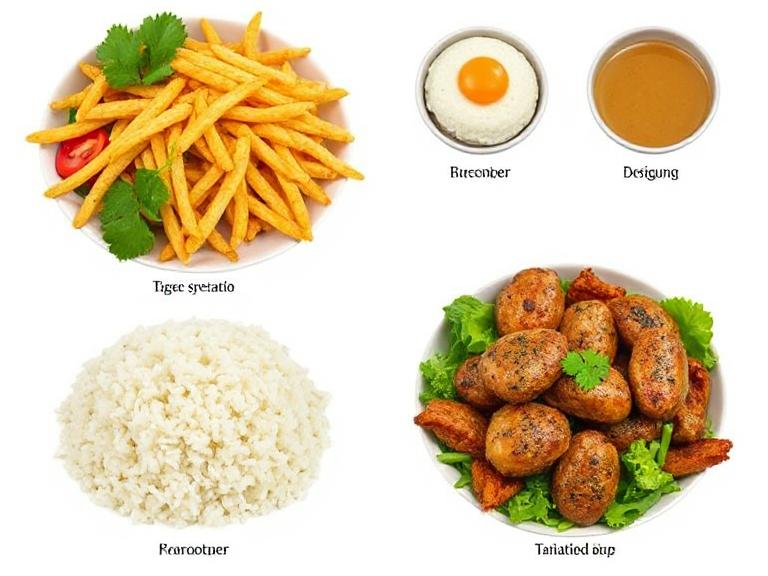All Examples of Halal Food: A Comprehensive Guide
Halal food plays a central role in the daily lives of millions of Muslims worldwide. Rooted in Islamic principles, Halal (meaning “permissible” in Arabic) ensures that food is prepared in accordance with religious laws. From fresh produce to processed meals, understanding what is Halal is essential not just for Muslims, but also for businesses catering to diverse communities.

Halalive APP
We are a group of dedicated youth and companies from around the world contributing to the Halal industry, united by a shared vision to promote cultural exchange and economic cooperation across countries along the Belt and Road Initiative. Whether from China or other nations, our team members and partners work together to bring high-quality Chinese-made Halal products to global markets, providing excellent services to the global Muslim community.
We actively support the Belt and Road Initiative, playing a bridging role in promoting Halal products and services, facilitating cross-border cultural integration and economic cooperation. Our goal is to make the Halal lifestyle more widely accepted and practiced worldwide.
Table of Contents
What is Halal Food?
Halal food is any food that is permissible to eat under Islamic law. The opposite of Halal is "Haram," meaning forbidden. The basis of Halal guidelines is found in the Quran and Hadith. Halal food must be:
Free from pork or pork by-products
Free from alcohol
Prepared with Halal-certified ingredients
Processed, transported, and stored using equipment that is not contaminated with Haram substances
Halal certification ensures that a food item meets all necessary religious requirements. This is crucial for Muslim consumers who want to maintain a religiously compliant diet.
Halal Meat and Poultry
Permissible Animal Types
Beef
Lamb
Goat
Chicken
Duck
Turkey
Slaughter Guidelines
To be Halal, animals must be slaughtered by a sane adult Muslim. The name of Allah must be invoked during the slaughter. The animal must be healthy at the time of slaughter, and all blood must be drained from the veins.
Halal Seafood Options
Seafood is generally considered Halal by most Islamic scholars, though there are varying opinions depending on the school of thought. The following are widely accepted as Halal:
Fish (all types including salmon, tuna, cod, etc.)
Shrimp
Lobster*
Crab*
Squid and octopus*
*Note: Some schools of Islamic jurisprudence consider shellfish and mollusks to be Makruh (discouraged) or Haram.
Halal Dairy Products
Dairy products are Halal as long as they do not contain any non-Halal additives such as:
Gelatin derived from pork
Rennet from non-Halal slaughtered animals
Halal Dairy Examples:
Milk
Cheese (made with microbial or Halal-certified rennet)
Yogurt
Butter
Cream
Grains and Bakery Items
Most grains and baked goods are Halal by default. However, caution must be taken with processed products that may contain alcohol-based flavoring or non-Halal shortening.
Halal Grain-Based Foods:
Rice
Oats
Bread (without non-Halal ingredients)
Pasta
Cereal (without alcohol-based flavors)
Fruits and Vegetables
All fruits and vegetables are inherently Halal. However, consumers must be cautious of:
Processed or canned products containing non-Halal additives
Vegetables cooked with non-Halal oils or fats
Halal Fruit and Vegetable Examples:
Fresh apples, bananas, oranges
Leafy greens
Root vegetables like carrots and potatoes
Tomatoes, cucumbers, and other raw veggies
Halal Snacks and Packaged Foods
Packaged foods require careful label inspection to ensure all ingredients are Halal. Many modern snacks contain questionable components like gelatin or emulsifiers.
Halal Snack Examples:
Chips made with vegetable oil
Halal-certified chocolate
Fruit snacks made with pectin instead of gelatin
Biscuits and cookies with Halal labeling
What to Watch Out For:
Gelatin (ensure it’s Halal-certified)
Emulsifiers and flavorings with alcohol content
Drinks and Beverages
All non-alcoholic beverages are considered Halal, provided they don’t contain any Haram ingredients. Alcohol is strictly prohibited.
Halal Beverages:
Water
Fruit juices
Milkshakes
Soft drinks (without alcohol content)
Herbal teas
Note: Some energy drinks and flavored products may contain trace alcohol or animal-derived additives. Always check for Halal certification.
Understanding Halal Certification and Labels
As demand for Halal food grows globally, certification agencies have become essential. Halal certification guarantees that a product complies with Islamic dietary law.
Recognized Halal Certification Bodies:
JAKIM (Malaysia)
HFA (UK)
IFANCA (USA)
HCB (China)
In the age of digital convenience, apps like Halalive make it easier to identify certified Halal products globally. From Chinese Halal foods to imported snacks, Halalive ensures transparency and authenticity for Muslim consumers across the globe.
Summary Table
| Food Category | Halal Examples | What to Avoid |
|---|---|---|
| Meat and Poultry | Halal-slaughtered beef, chicken, lamb | Non-Halal slaughtered meats, pork |
| Seafood | Fish, shrimp | Shellfish (disputed) |
| Dairy | Milk, yogurt, cheese with Halal rennet | Cheese with non-Halal enzymes |
| Grains & Bakery | Bread, pasta, cereal | Alcohol-based flavorings |
| Fruits & Vegetables | All fresh produce | Vegetables cooked in non-Halal fats |
| Snacks | Chips, cookies with Halal labels | Snacks with gelatin, emulsifiers |
| Beverages | Juices, milk, tea | Alcoholic drinks |
Source:
Internet
This article does not represent the stance of HalaLive, does not assume legal responsibility.
